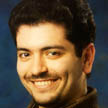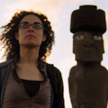I’m a Scientist is like school science lessons meet the X Factor! School students choose which scientist gets a prize of $1000 to communicate their work.
Scientists and students talk on this website. They both break down barriers, have fun and learn. But only the students get to vote.
This zone is the Organs Zone. It has scientists studying health and disease in various parts of our bodies. Who gets the prize? YOU decide!









Zeekybom10, great question.
It’s a really hard one thought.
While lots of scientists are working on sleep and dreams, it seems like we don’t actually know too much about dreams.
There are 4 steps to sleep, and dreaming happens in stage of sleep called REM or rapid eye movement sleep.
We enter REM sleep about 5 times in an average 8 hour period of sleep. If we assume that we dream during each of these REM periods, then in one year, we will have had 1,825 dreams! Of course we don’t remember all of these dreams. A 75 year old person would have about 136,875 dreams!
As for how we take information for our real lives, there’s no real answer, but doctors and scientists think that we might use our dreams to princess some of the things that have happened in our real life. Also, they say that when we dream about our real life, that it’s often not really about the exact person, or situation you are dreaming about, which is why a person may look like one person, but in fact, in your dream you know they are someone else. We don’t really know why dreams mix up our reality, but lots of people are studying it! 🙂
1
Not my field at all LOL
What I know is people usually dream about something that have been on their mind.
I always think of dreams as your body’s “screen saver”, so that you can rest 😛
0
I went to a conference last year where a scientist looking at rats dreaming showed that the rats were replaying their day time experience in their dreams. The same neurons that were active when they explored a maze during the day were also active and active in the same order while they were sleeping. Could dreaming be important for memory?
0
Hi zeekybom10 – this is an excellent question and a huge area of research!
Hannah very nicely outlined the basic about dreaming (wow didn’t know that’s how many dreams we have!! – if only I could remember them all!)
Modern techniques such as brain imaging have created sophisticated ways to study of the dreaming brain but there are still many questions as to why we dream, what the purpose of dreaming is and how do we make sense of the content of dreams. There is a lot of non-science out there that tries to describe what dreams mean – this may be fun (like astrology) but it’s important to know this is NOT science!
What we do know is that certain parts of our brain (areas related with vision, sound, reasoning, emotion, etc) are active while we are asleep and in communication with each other. There are specific biochemical (substances made by the body) pathways that are switched on while you dream – what they do is not clear but sleep neuroscientists and psychiatrists have discovered that REM sleep/ the dream state is linked to low levels of serotonin (the happy neurotransmitter) and high levels of another neurotransmitter acetylcholine. Dreams may be vivid (very clear) to recall or you may not remember them and they can share information that you experienced when you are awake – but maybe slightly distorted ie. being in class and realising you’re in your underwear!
There is a great summary about research into this area and concerns about accuracy in studying dreams here: https://en.wikipedia.org/wiki/Cognitive_neuroscience_of_dreams
0
Not my field at all… But as an interesting thing…I’m a “lucid dreamer”, which means that I’m aware of my dreams and can change them when I want to. It’s pretty useful when you’re having nightmares. 🙂
0